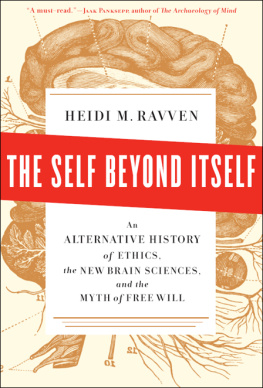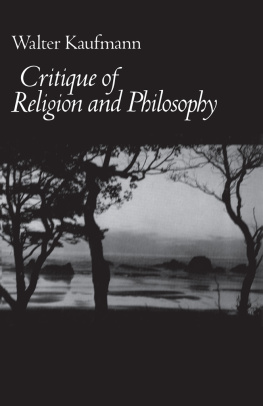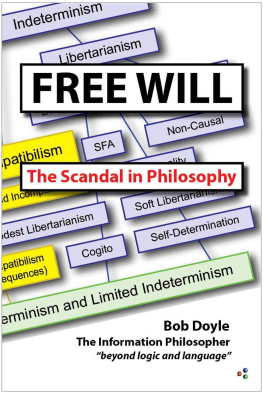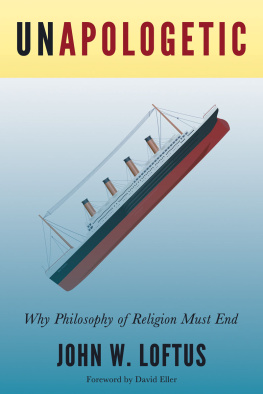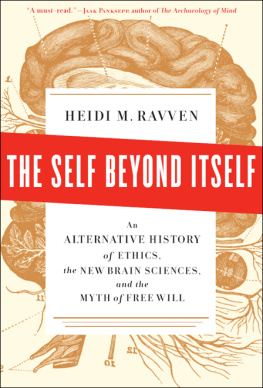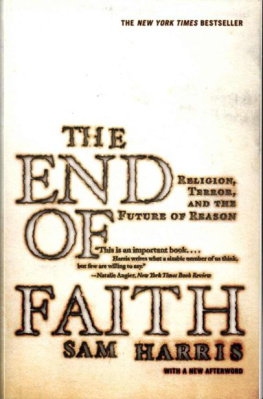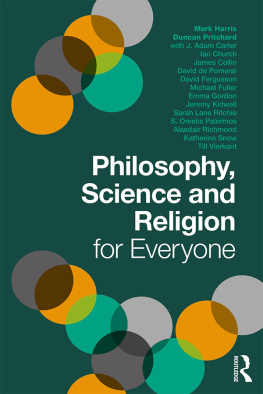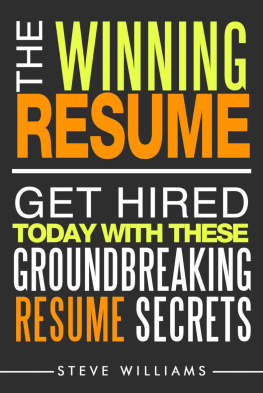The Self Beyond Itself
The Self
Beyond Itself

An Alternative History of Ethics, the New Brain
Sciences, and the Myth of Free Will
Heidi M. Ravven

The Self Beyond Itself
2013 by Heidi M. Ravven
All rights reserved.
No part of this book may be reproduced, in any form, without written permission from the publisher.
Requests for permission to reproduce selections from this book should be mailed to:
Permissions Department, The New Press, 38 Greene Street, New York, NY 10013.
Published in the United States by The New Press, New York, 2013 Distributed by Perseus Distribution
LIBRARY OF CONGRESS CATALOGING-IN-PUBLICATION DATA
Ravven, Heidi M., 1952
The self beyond itself : an alternative history of ethics, the new brain sciences, and the myth of free will / Heidi M. Ravven.
p. m.
Includes bibliographical references and index.
Summary: A critique of free will that draws on neuroscience, philosophy, and religionProvided by publisher.
ISBN 978-1-59558-800-5 (e-book)
1. Ethics. 2. Neurosciences. 3. Free will and determinism. I. Title.
BJ1012.R349 2013
170dc23
2012031769
Now in its twentieth year, The New Press publishes books that promote and enrich public discussion and understanding of the issues vital to our democracy and to a more equitable world. These books are made possible by the enthusiasm of our readers; the support of a committed group of donors, large and small; the collaboration of our many partners in the independent media and the not-for-profit sector; booksellers, who often hand-sell New Press books; librarians; and above all by our authors.
www.thenewpress.com
Composition by Westchester Book Composition
This book was set in Adobe Caslon
2 4 6 8 10 9 7 5 3 1
To the memory of my parents, zl
Avi mori, Robert Maurice Ravven, M.D., Ph.D.,
A free man thinks of death least of all things, and his wisdom is a
meditation on life, not of death (Baruch Spinoza)
and
Lucille Morrison Ravven, M.A.,
All things noble are as difficult as they are rare (Baruch Spinoza)
and to the memory of my exalted teacher, zl
Professor Alexander Altmann,
Intellectual thought in constantly loving Him should be aimed at
(Moses Maimonides)
The germ of the idea for this book was planted by Constance H. Buchanan, senior program officer in religion at the Ford Foundation. Unexpectedly but fatefully, in January 2004 I received a call from Connie inviting me to submit a proposal for a project that would rethink ethics. That call set me on the path that, nine years later, has resulted in this book. I am grateful beyond measure to Connie and the Ford Foundation for making it possible for me, through their extraordinary grant of $500,000 over a five-year period, to think more broadly and in a multidisciplinary way about why people are ethical, why they are not, and how to get them to be more ethical. For five years the Ford Foundations Progressive Religion and Values group met twice a year. I thank the other members, a fascinating and diverse group of scholars and practitioners of religion, for their willingness to listen to my work in progress, their ideas and critiques, and their encouragement. Connies gentle encouragement, sharp intellect, and critical reading carried me through the stages of the development of the project.
I have been blessed with astute, thoughtful, rigorous, and kind readers. I cannot adequately express the gratitude I owe so many, of whom I will name but a few. Marc Favreau, editorial director of The New Press, is the best reader and editor one could ever imagine having. Warren Zeev Harvey of the Hebrew University read version after version of crucial chapters. Bernadette Brooten of Brandeis University, Jaak Panksepp of Washington State University, John McCumber of the University of California at Los Angeles, Joe Keith Green of Eastern Tennessee University, Wendell Wallach of the Yale Center for Bioethics, Karen L. King of the Harvard Divinity School, Sheila Greeve Davaney of the Iliff School of Theology and subsequently of the Ford Foundation, James Wetzel of Villanova University, and Bonnie Kent of the University of California at Irvine offered crucial avenues to pursue and thoughtful advice. My Hamilton College colleagues Marianne Janack, Bonnie Urciouli, Richard Werner, Henry Rutz, Doris Rutz, and Richard Seager read chapters and discussed ideas with me on multiple occasions. Many colleagues in philosophy and its history and related disciplines also generously gave of their time and shared ideas, including Richard C. Taylor of Marquette University, David Burrell of Notre Dame, Daniel Boyarin of the University of California at Berkeley, Lee C. Rice of Marquette University, Vance Maxwell of Memorial University of Newfoundland, David Novak of the University of Toronto, Norbert Samuelson of Arizona State University, Hava Tirosh-Samuelson of Arizona State University, Anne Klein of Rice University, Ebrahim Moosa of Duke University, Edwin Winckler of Columbia University, Patricia Longstaff of Syracuse University, Warren Montag of Occidental College, and Allen Manning of the State University of New York at Oswego.
Because of the multidisciplinary nature of the project, I met with a wide range of scholars and practitioners. I wish to thank Don Denetdeal, Herbert Benally, James McNeley, and Mark C. Bauer of Dine (Navajo Community) College; Oswald Werner of Northwestern University; Duncan Ryuken Williams of the University of California at Berkeley; Reverend Masao Kodani of the Senshin Buddhist Temple, Los Angeles; Elizabeth Napper of the Tibetan Buddhist Nuns Project in Dharamsala, India; Dr. Maher Hathout of the Muslim Public Affairs Council of Los Angeles; Thomas Lickona of the State University of New York at Cortland; Merle Schwartz of the Character Education Partnership in Washington, D.C.; and Max Malikow of LeMoyne College in Syracuse.
I am deeply grateful to Hamilton College; its academic deans David Paris, Joseph Urgo, and Patrick Reynolds; and the chair of my department, Richard Seager, for having been wonderfully supportive and protective of me and of the project, granting me a total of three and a half years of leave in the course of it and also granting me the flexibility to focus on its demands while trying to keep up with teaching and service. I also thank my students in my course on Spinozas Ethics for their lively engagement with, wonderful insights into, and passionate love of the text.
On a more personal note, I cannot thank my family enough for their patience and support throughout this lengthy project. It has consumed me at times, sometimes appearing as if it were a mission impossible or perhaps without end. There have been within my immediate family illness, marriage, divorce, the birth of a granddaughter (the beautiful and delightful Lucy Morris-Ravven), and my remarriage in the years the writing of this book has spanned. I am grateful to the late Dr. Robert Seidenberg for helping me through these life changes and keeping me on track. My daughter, Simha Ravven, MD, along with my work, are the sources of my greatest joy and pride. To the extent that Simi had to defer to the book, especially at the end and at a crucial time in her life, I am regretful. I am grateful to my life partner, Eric J. Evans, for his appreciation of the project and for his understanding and tolerating its demands upon me. Finally, I have lived for almost four decades with the knowledge of the faith that my eminent professor Alexander Altmann placed in me. I hope I have at long last somewhat redeemed that faithand that of my parents. May their memories be blessed.

